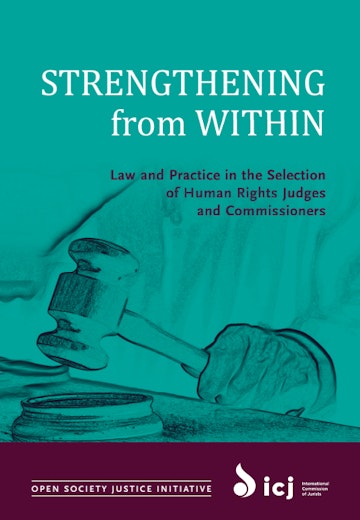Independent Panel Finds Only Three of Five Inter-American Human Rights Commission Candidates Qualified for Office
NEW YORK— A new report by an independent panel of experts has found that only three of five candidates are qualified to fill four vacancies on the Inter-American Commission on Human Rights. The panel is part of a continuing effort by civil society to promote a more transparent, independent, and merit-based selection process for the influential regional human rights body.
“It is disappointing that OAS member states have failed to put forward a fully qualified slate of candidates for the Commission. But it would be even more distressing if these states voted for any unqualified individual to serve on the region’s premier human rights body. The OAS can and must do better,” said James A. Goldston, executive director of the Open Society Justice Initiative.
The Organization of American States has scheduled the election of the four new commissioners during its annual General Assembly on June 26th-28th in Medellin, Colombia. The Commission—a regional body tasked with monitoring human rights across the Americas—has seven members in total. Members serve four-year terms and may be re-elected once. The panel assessed candidates’ qualifications for election according to the American Convention on Human Rights and the Statute of the Inter-American Commission, which collectively set out the minimum requirements for service as a commissioner.
The panelists found the following candidates suitable to hold office:
- Esmeralda Arosemena de Troitiño (nominated by Panama)
- Julissa Mantilla Falcón (nominated by Peru)
- Margarette May Macaulay (nominated by Jamaica)
Candidates Everth Bustamante García (nominated by Colombia) and Edgar Stuardo Ralón Orellana (nominated by Guatemala) were unable to demonstrate that they met the required criteria.
As previous panels have done, the new report expresses concern about the small number of candidates proposed to fill the four vacancies. In its recommendations, the panel urged that states make the nomination and election processes more transparent – including making public calls for applications and having an independent review body at the national level, and forming a standing, independent advisory committee at the OAS level to assess all nominated candidates.
The 2019 panel is composed of five renowned jurists and academics from the regional human rights community: Mariclaire Acosta (Mexico), Carlos Ayala (Venezuela), Catalina Botero (Colombia), Juan Mendez (Argentina), and Judith Schönsteiner (Chile). The panel’s independent, three-month analysis included conducting interviews and collecting information from member states, the candidates, and from key stakeholders and organizations in the region.
The Open Society Justice Initiative, the Due Process of Law Foundation, and the Center for Justice and International Law again convened this year’s panel. The groups convened similar panels in 2015, 2017, and 2018 to evaluate candidates from both the Commission and the Inter-American Court of Human Rights. For the second year in a row, the Center for Human Rights and Humanitarian Law of the American University Washington College of Law served as the Panel's secretariat.
Since 2015, NGOs, universities, and bar associations throughout the region have endorsed the initiative, which share a commitment to strengthening the Inter-American human rights system, through the principle of fair, transparent, and inclusive elections, and through the nomination of qualified and independent candidates.
The final report of the panel is currently available in Spanish. An English version of the report will be available in mid-June.
